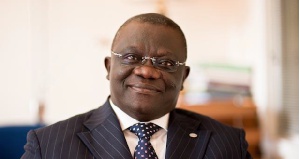Financial expert and former Chief Executive Officer of Ecobank Group, Albert Essien, has called on private investors to pool their resources to create a fund or investment vehicle that could support the country’s economic recovery.
He said a pool of patient private capital has the potential to leverage additional funding from other sources, including international development agencies and multilateral organisations.
This approach, he noted, is essential to Ghana’s economic recovery, since it would allow the country to wean itself off dependence on imports – essentially creating a win-win situation for all stakeholders.
“One potential benefit of pooling private capital is that it can help to leverage additional funding from other sources, including international development agencies and multilateral organisations. Demonstrating a commitment from the private sector to support Ghana’s economic recovery can help to attract additional investment and funding from other sources,” Mr. Essien said.
Mr. Essien made this call during his keynote address at the Ghana Venture Capital and Private Equity Association 2023 conference, where he explained that pooling private capital could involve and invigorate investments in critical sectors such as healthcare, real estate, infrastructure and agriculture.
In addition, he mentioned that strategic partnerships with development finance institutions (DFIs) could also provide matching funds and expert support for developing and creating efficiencies in investee companies. “This approach could be a win-win for both DFIs and local private (PE) and venture capital (VC) funds. For instance, the AfiG Funds LPs – such as International Finance Corporation (IFC) – provide capital and expertise to support the growth of investee companies.”
Private equity and venture capital funds are set to invest at least US$30million in small and medium-scale enterprises (SMEs) this year, providing financing to companies at various stages of growth. This year, Venture Capital Trust Fund has committed to deploying approximately GH¢200million – aimed at supporting managers who can rapidly deploy it to the real sector and strengthen the economy’s resilience.
These funds are expected to provide access to much-needed capital for companies that may struggle to secure financing from traditional sources, such as banks. Investing in SMEs, private equity and venture capital funds helps to stimulate economic growth and job creation.
To create a vibrant PE/VC ecosystem, “PEs and VCs should share best practices and lessons learned, creating a body of knowledge that can influence and drive policy initiatives. This approach will help create a thriving private equity industry that will unlock and drive sustainable economic recovery for SMEs and the country,” he said.
Noting that government intervention in the private equity and venture capital space is not unusual, Mr. Essien highlighted four fundamental approaches through which government could create a conducive legal/regulatory and tax framework for PE/VC funds. The first approach involves government recognising the lack of risk financing that is preventing innovative ideas with commercial potential from reaching the market.
He suggested that through a public-private partnership (PPP), government could create an incubation programme to pivot innovative businesses through a venture capital fund.
The third mode of intervention, he noted, is being exemplified by the Venture Capital Trust Fund (VCTF) – a government-sponsored fund of funds that provides seed capital to PE/VC funds in the ecosystem. “This approach builds the capacity of domestic fund managers and co-investors, creating a supportive environment for SMEs.”
The final approach is direct government participation through creating a PE fund-type structure like the Ghana Amalgamated Fund (GAT), which supports critical strategic assets to meet their solvency requirements.
In addition, Mr. Essien suggested an intentional approach by government and private entities to create an entrepreneurship challenge, like the national science and math quiz – as this would encourage entrepreneurship and innovation at tertiary institutions, converting the comparative advantage of having a youthful and vibrant population into a competitive advantage.
Doing this, he added, will ensure that the youth will no longer be job-seekers but job-creators.
“Ghana’s current financial crisis presents a significant challenge and an opportunity to explore new ways of mobilising resources to support economic recovery and growth. The opportunities in Ghana and Africa are wrapped in their unique challenges. It is time for Ghana to develop home-grown solutions to the many problems it is afflicted by,” he said.
Business News of Tuesday, 2 May 2023
Source: thebftonline.com













